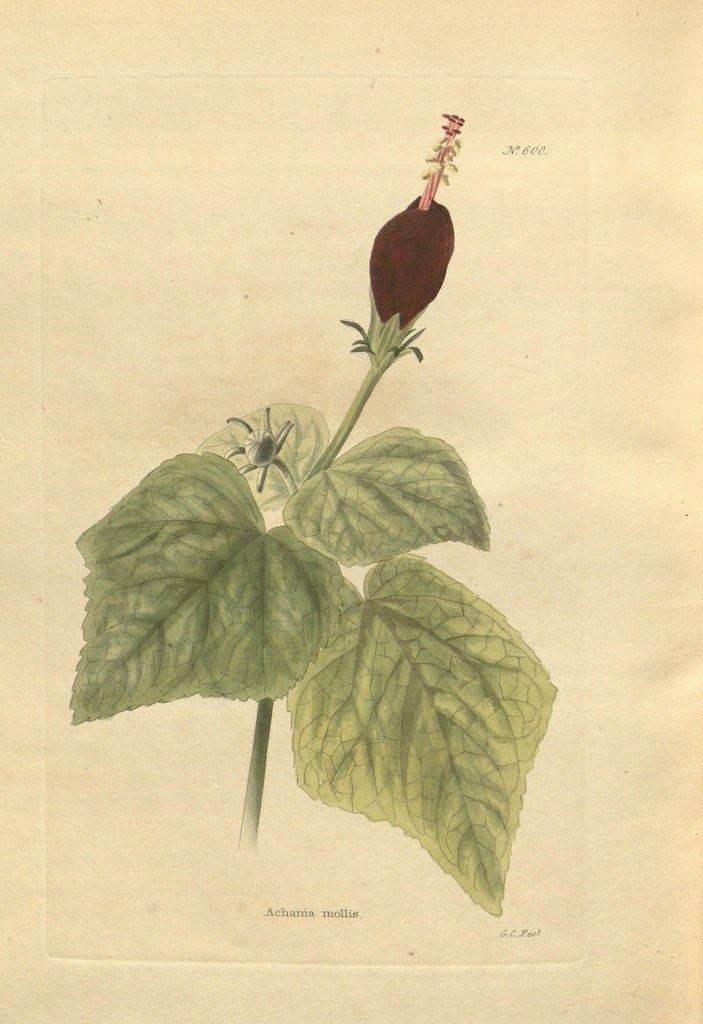#Turk's turban
Video
n213_w1150 by Biodiversity Heritage Library
Via Flickr:
The botanical cabinet London :John & Arthur Arch ...,1817-1833. biodiversitylibrary.org/page/29152594
#Missouri Botanical Garden#Peter H. Raven Library#bhl:page=29152594#dc:identifier=https://biodiversitylibrary.org/page/29152594#flickr#botanical illustration#scientific illustration#Achania mollis#Malvaviscus arboreus var. arboreus#Malvaviscus arboreus#wax mallow#turk's turban#sleeping hibiscus#manzanilla#manzanita#manzantia de pollo#ladies teardrop#scotchman's purse
0 notes
Text
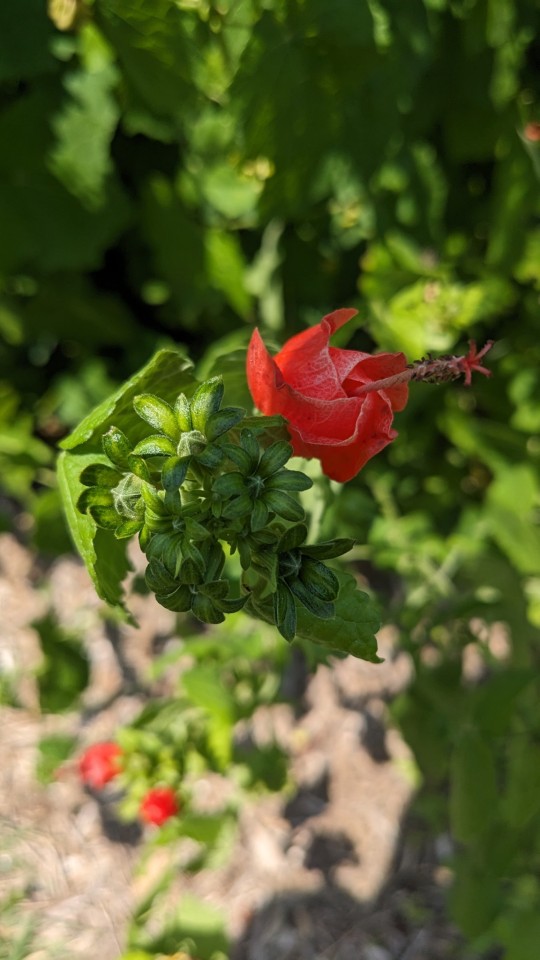
Malvaviscus arboreus var. drummondii / Wild Fuchsia at the Juniper Level Botanical Gardens in Raleigh, NC
#Malvaviscus arboreus var. drummondii#Malvaviscus drummondii#Wild Fuchsia#Ladies' eardrops#Scotchman's purse#Turk's turban#Turk cap#Nature photography#Flowers#Juniper Level Botanical Gardens#Raleigh NC#Raleigh#North Carolina
1 note
·
View note
Text



GROWIINGGG!!!!! August 25th, 27th and 29th.
A fully grown turban squash is:

the smaller, striped part is where the bud and petals used to be.
#gardening#home garden#vegetables#squash#squash saga#the squash pit#grower not a shower#growth#beauties#turk's turban squash
2 notes
·
View notes
Text
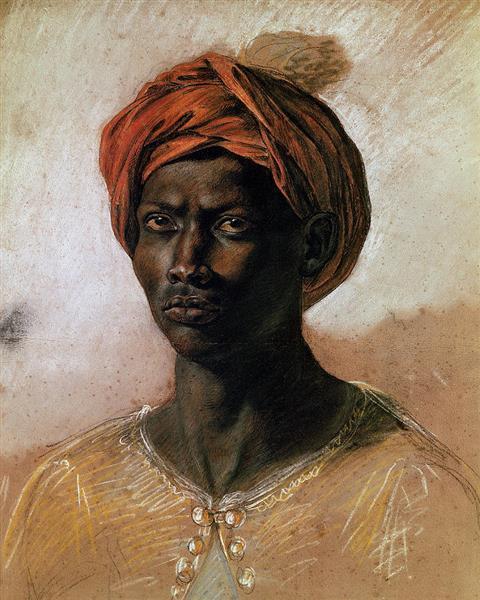
Title: Portrait of a Turk in a Turban
Artist: Eugene Delacroix
Date: 1826
Style: Orientalism
Genre: Portrait
#art#painting#art history#artwork#museums#history#culture#orientalism#portrait#eugene delacroix#vintage
92 notes
·
View notes
Note
Trick or treat! :D
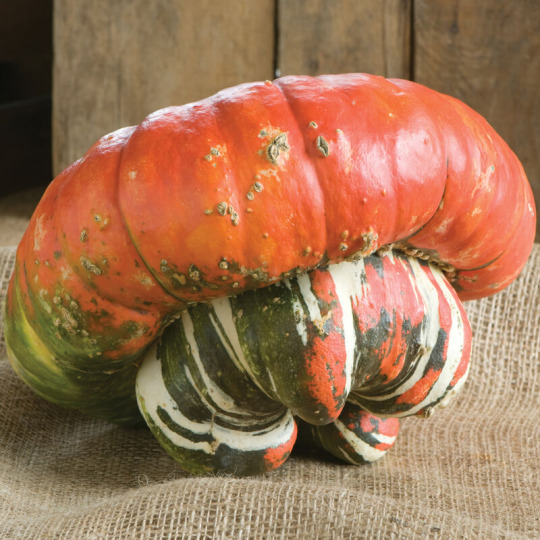
Behold the glory of the Turk's Turban squash! I love the colors and the unusual shape!
24 notes
·
View notes
Photo
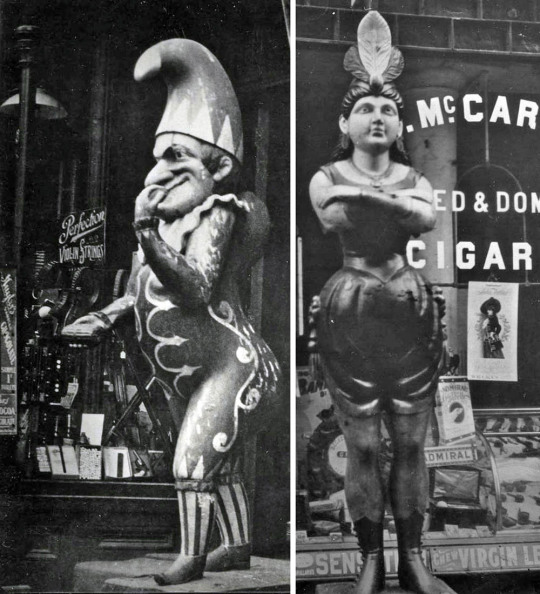
Life-sized wooden statues outside cigar stores, 1926.
Shops in the 18th and 19th centuries often had signs or figures outside to indicate to an illiterate or non-English speaking population the type of goods or services provided. Wooden carvings of people indicated that tobacco was for sale inside. Statues of Indians were common, for it was the native people who had introduced European settlers to the stuff. In Britain, carvers had never seen a real Indian, so they had to use their imagination, and the result was far from reality.
Cigar store Indians came to the U.S. in the late 18th century. In time, carvers expanded their repertoire to include other kinds of figures—Turks with turbans, soldiers, fashionable ladies. Many of the carvers, who began by creating figures for ships, were located in New York. By the end of the 19th century, however, cities began passing zoning ordinances about the width of streets, and these figures began to disappear. But, as Hoppé's photos testify, there were still some being used in 1926. Today they are collectors' items.
Photos: E.O. Hoppé via the Bruce Silverstein Gallery
#New York#NYC#vintage New York#1920s#E.O. Hoppé#cigar stores#cigar store Indians#statues#wooden statues#carvings#advertising#tobbacconist#tobacco#tobacco stores
154 notes
·
View notes
Text
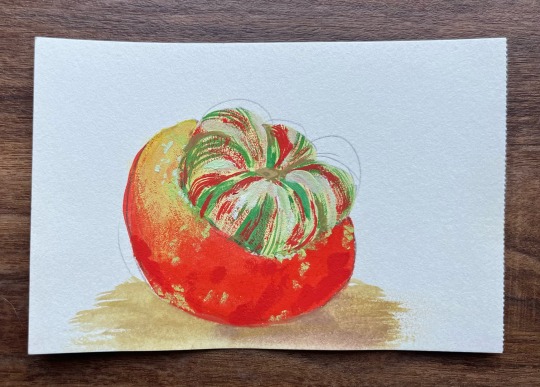
Turk’s Turban Squash, gouache on paper, 4x6 inches, for @jordanillustrates’ Artober prompt “Gourd + Squirrel.” I’ve always loved the shapes and colors of these squash! Also I cranked this one out in like 20 minutes while watching Jeopardy a few days ago.
9 notes
·
View notes
Text
Buckle up, folks, it’s time for chapter 41 of Moby-Dick and some whale-posting.
First up: pregnancy metaphors! Because I noticed them being a thing and apparently Melville’s wife was going through some pretty miserable times per my local Melville expert @branch-and-root:
in such latitudes and longitudes, pursuing too such a calling as he does, the whaleman is wrapped by influences all tending to make his fancy pregnant with many a mighty birth.
and
the outblown rumors of the White Whale did in the end incorporate with themselves all manner of morbid hints, and half-formed fœtal suggestions of supernatural agencies, which eventually invested Moby Dick with new terrors unborrowed from anything that visibly appears.
Which links in to the other persistent thing I’ve been paying attention to, which is the way Moby Dick is described as actively, inherently malicious: he’s not just an animal going about his animal life in the sea and trying to escape being hunted down and turned into oil, he is actively evil and bloodthirsty:
With greedy ears I learned the history of that murderous monster against whom I and all the others had taken our oaths of violence and revenge.
Moby Dick is out to murder him some whalemen.
a Sperm Whale of uncommon magnitude and malignity, which whale, after doing great mischief to his assailants, had completely escaped them;
He’s malignant and doesn’t even have the courtesy to stick around after he’s fucked with you!
various and not unfrequent instances of great ferocity, cunning, and malice in the monster attacked;
He’s not just malicious, he’s smart, and that’s an unnerving thing in a whale.
we find some book naturalists—Olassen and Povelson3—declaring the Sperm Whale not only to be a consternation to every other creature in the sea, but also to be so incredibly ferocious as continually to be athirst for human blood.
(Okay, technically this description is for all sperm whales, but if you were bopping along in the ocean and a bunch of randos tried to stick you with spears, you’d probably take offense too.)
the unearthly conceit that Moby Dick was ubiquitous; that he had actually been encountered in opposite latitudes at one and the same instant of time.
Not only is Moby Dick dangerously smart and wicked, he’s practically supernatural.
Forced into familiarity, then, with such prodigies as these; and knowing that after repeated, intrepid assaults, the White Whale had escaped alive; it cannot be much matter of surprise that some whalemen should go still further in their superstitions; declaring Moby Dick not only ubiquitous, but immortal (for immortality is but ubiquity in time); that though groves of spears should be planted in his flanks, he would still swim away unharmed; or if indeed he should ever be made to spout thick blood, such a sight would be but a ghastly deception; for again in unensanguined billows hundreds of leagues away, his unsullied jet would once more be seen.
Even if some crew did manage to take the white whale out, it wouldn’t stick: Moby Dick would just come back, probably stronger than before.
Nor was it his unwonted magnitude, nor his remarkable hue, nor yet his deformed lower jaw, that so much invested the whale with natural terror, as that unexampled, intelligent malignity which, according to specific accounts, he had over and over again evinced in his assaults. More than all, his treacherous retreats struck more of dismay than perhaps aught else.
It’s not (just) that Moby Dick is really big (please note I am not making size queen jokes about Ahab here even though I could), or deformed, or weirdly white (though more on that next chapter): it’s that he’s smart.
yet, in most instances, such seemed the White Whale’s infernal aforethought of ferocity, that every dismembering or death that he caused, was not wholly regarded as having been inflicted by an unintelligent agent.
Scary smart.
No turbaned Turk, no hired Venetian or Malay, could have smote him with more seeming malice.
Note that this is after Ahab flung himself at the whale armed with nothing but a six-inch knife and his rage.
That intangible malignity which has been from the beginning;
And one last mention of malignity for the road.
23 notes
·
View notes
Text
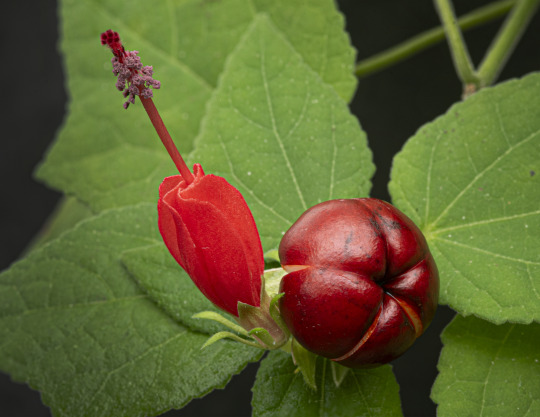
Malviscus arboreus is in the hibiscus family and is native to Mexico, Central America and tropical South America. It has a lot of interesting common names including wax mallow, Turk's turban, sleeping hibiscus, manzanilla and ladies teardrop. My favorite, however is Scotchman's purse because the flowers never really open up.
3 notes
·
View notes
Text
“[Brian Duffy] was staring moodily ahead at the tall bulk of the church of San Zaccaria, its gothic design undisguised by the Renaissance adornments that had recently been added to it, and he was wondering just how much he would miss this city when he left. ‘Only a matter of time,’ Marozzo had said over dinner. ‘Venice is more than half a Turkish possession right now, what with that grovelling treaty they signed eight years ago. Mark me now, Brian—before our hair is completely white, you and I will be teaching the uses of the scimitar instead of the honest straight sword, and our students will be wearing turbans.’ Duffy had replied that he'd shave his head and run naked with the jungle pygmies before he'd teach a Turk even how to blow his nose, and the conversation had moved on to other matters—but Marozzo had been right. The days of Venice's power were fifty years gone.”
— The Drawing of the Dark
2 notes
·
View notes
Text
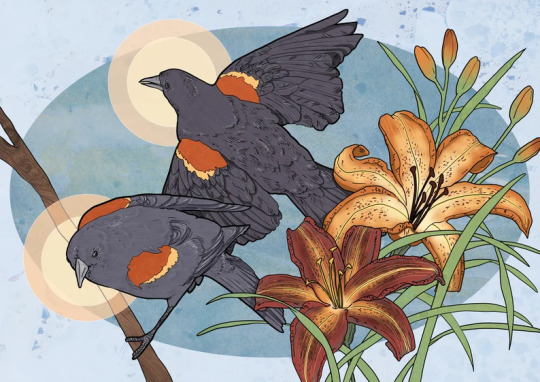
TheForagersDaughter
#the foragers daughter#theforagersdaughter#foragers daughter#forage#redwing blackbird#red wing blackbird#red wing black bird#redwing black bird#tiger lily#american tiger lily#Lilium superbum#Turk's cap lily#turban lily#swamp lily#lily royal#botanical drawing#botanical illustration
7 notes
·
View notes
Text
Fate Actor AU
I am literally on a roll with these xD. Like these ideas keep popping up every time.
- This show was also produced and directed by Jonathan Joestar. Yeah Jonathan is the King of anime shows xD.
- This show has the most culturally diverse cast
- Gilgamesh is actually Turkish, well part Turkish part Iranian. He was born and raised in Istanbul and he and Eren Jaeger were best friends and neighbours since childhood
- They both promised each other that no matter what they would both make it in the entertainment industry and be successful and famous. Their wish came true years later and the two of them always talk about it in interviews
- Altoria is actually British like her character, Iskandar is from Greece, Lancelot is American, Hercules is actually South American, Medusa is from France, Emiya is Japanese but was raised in Italy, Cu is from Denmark, Diarmuid is also Dannish, Gilles is from France, The Hassans are all from Saudi Arabia, Medea is from Greece. Enkidu is Turkish as well
- Everyone speaks their national language at times and they kind of understand each other
- Everyone agrees that Kirei is the worst cook whilst Emiya is the best
- Gilgamesh is different from his character in the sense that he is an actual chill dude though he can be tsundere xD
- He got tummy aches from the laughs
- Speaking of the laughs, he did several takes because he just could not stop laughing and that is because Altoria always says something to make him laugh
- He respects Altoria a lot and is protective of her much to everyone’s amusement
- Altoria likes Gilgamesh and teases him a lot
- The gang always swap stories about their upbringing and whatnot
- Everyone is protective of the younger Masters like Ritsuka, Tine and Hakuno
- Kirei and Gilgamesh often play chess on set and often ask Tokiomi to hang with them
- Rin is Tokiomi’s real life daughter plus she plays both Ishtar and Ereshkigal plus herself
- Her bickering with Gilgamesh when in Ishtar mode makes everyone laugh
- Sakura plays a handful of characters as well as Shirou
- There was a character so many Turks requested for for years to be added to Fate Grand Order- Sultan Mehmed the Conqueror
- Jonathan always wanted to add this character but could not think of someone to play this character until Gilgamesh suggested one name: Eren Jaeger
- Jonathan was skeptical at first till he saw Eren did a reading for him. Plus seeing Eren in full costume complete with the signature turban and giving off some Gilgamesh-esque vibes helped
- Eren loved playing his character and thanked Gilgamesh for helping him land the role
- The segments involving the Sultan and Gilgamesh were considered hilarious as the dynamic between those two is similar to the one Gilgamesh has with Ozymandias and Iskandar. Only difference is that these two always bicker xD.
- Eren’s signature Mehmed laugh is similar to Gilgamesh’s laugh and he too got tummy aches from excessive laughter xD
- Ozy is a proud Egyptian and gave the casta t our of Egypt alongside the Egyptian servants
-Nitocris always gets nervous whenever she shoots a scene
- Cleopatra once got severe burns on set thanks to some skincare product she bought and had to be taken to the hospital for treatment
- Caesar eats a lot and Cleo worries about his health
- Speaking of Ozymandias and Iskandar, the both of them plus Arthur, Eren and Gilgamesh hang out off-set and often get into prank wars on set with Jeanne Alter, Altoria, Ushiwakamaru, Rin and Sakura
-Jeanne and Jeanne Alter are twins
- Nursery Rhyme and Jack the Ripper always play outside with the other kids from other sets
- Gilgamesh wishes to settle down soon. Altoria always nags him to go get a girlfriend and she and Enkidu have tried setting up blind dates for him. Truth is Gilgamesh is in love with someone and it is not Enkidu or Altoria or even Ozymandias as many suspect. People suspect Eren because one story about them getting it on onset. Both have neither denied nor confirmed it.
- Hercules is such a gentle giant and everyone loves and cares for him, plus he talks normally
- All the Roman servants often annoy the Turks on set who chase after them every time
- Nero always gives everyone chocolate every single Valentine’s Day
- Elizabeth is an actual good singer and was confused as to how to sing badly for her character
- Camille and the vampiric servants drink wine a lot and often invite Dio over for a chat
- The Jojo set is close to the Fate set so the Jojo cast often visits
- The younger servants love playing hide and seek on set and also tag. The young Jojo kids join in the fun.
- One of the highlights every evening is that everyone from the Jojo, Fate and other related sets come out and sit by a bonfire and start talking about life. The older folks give the younger ones advice.
- Snowball fights ahoy
- Everyone calls Jonathan either Jojo or dad
- There was a lot of fight and stunt training for the entire cast, something they all enjoyed
- Gilgamesh likes the whole concept of the show which was why he agreed to it in the first place
- Medea always forgets her lines
- Illya likes messing with Hercules’s hair
- Everyone plays the different versions of themselves
- Ashiya Douman is the resident troll on set
- Gilgamesh did not like the armour at first due to how bulky it was but he soon got used to it and ended up liking it
#gilgamesh#attack on titan#eren jaeger#shingeki no kyojin#fate#fate grand order#iskandar#ozymandias#altoria pendragon#rin tohsaka#kirei kotomine#tokiomi tohsaka#sakura#shirou emiya#medea
9 notes
·
View notes
Note
shakespeare asks 4 20 28 29 kisses!!!
4. Is all justified in the name of true love?
unfortunately of the opinion that true love is actually the deepest form of self identification, or a proxy for something bigger that is unattainable. illustrations: for the former predestination (2014), wuthering heights (1847), dead ringers (2023); for the latter othello (1603), succession (2018-23), etc. which basically means true love is a reason as selfish as any other to do something drastic; cringe bidart voice you can convince ppl anything is moral
20. Favorite Shakespeare quote? Favorite play?
i'll restrict myself to two: Come, gentle night, come, loving, black-browed night,/Give me my Romeo. And when I shall die,/Take him and cut him out in little stars,/And he will make the face of heaven so fine/That all the world will be in love with night...
and second, serve god, love me and mend.
which are both so cliche but they've stuck with me so. honorable mention to othello's
(...)Set you down this.
And say besides, that in Aleppo once,
Where a malignant and a turbanned Turk
Beat a Venetian and traduced the state,
I took by th’ throat the circumcisèd dog,
And smote him, thus.
which is not the play's best or most interesting in the least but my personal favorite just for all the implications
and ofc my favorite play is OTHELLO. soo many quotes i could pick from it as my faves tbh i really did not do my love for it justice in answering this. also to be fair i have only read four of his plays so far so this is subject to change
28. “By the pricking of my thumbs, / Something wicked this way comes.” Do you think you are a good person? What does it even mean to be “good”, to be “wicked”? Could you be good? Could you be wicked?
honestly i have a very simplistic view of goodness lol its the bend in the road where action eclipses intention, everyone has capacities for both, etc. but also i do think the talk about morality can be bereft of the factor of agency and its complicated relationship with social roles, instead often subsuming that nuance under the umbrella of identity. not least bc of the law and the role it plays in influencing the perceived social code of morality or w/e, where so many of the choices people make are guided by a publicized fear panopticon-style that leaves my ideas of what constitutes a good and a horrible person both at the fringes, and how this conflation of exclusionary motivations is like a perpetual motion machine in a way; at least, so goes the thought train on my cynical days. highly personalized answer that does not cohere. i haven't even scratched the surface of all i need to read on this to crystallize the opinions. anyway i absolutely have to quote miss weil here about how fictional evil is interesting, marvelous, romantic, but real evil is banal, straightforward, even universal in a way. while real goodness is singular in a way fictional goodness often isn't. you know.
29. Do you believe in magic or witchcraft, even just a little?
the same way most people do, i think - in everyday wonders you can't comprehend. empathy doesn't come often or easy to me so many things people consider basic ARE v much magical and unfathomable to me as someone with a limited emotional imagination at least outside the scope of fiction. which makes me sound like that parent who tweeted that being required to comfort her kid was unfair emotional labor lmao but obviously not how i mean it - i'm just frequently astounded by ppl's capacity for patience and kindness. addendum cooking is witchcraft to me. i haven't learned it yet properly but i will continue to hold this opinion even when i do bc its the art whose practice baffles me the most. so i guess the short answer is no bc i am easily enchanted by the mundane lol
(post)
#asks#i love always giving horribly tangential replies. just saying shit innit#re Q4 ofc illustrations does not mean sources it means examples of what i referred to that illustrate my meaning !#irrespective of the quality of the art itself.#anyway mwah ty for the ask jules <3#sorry this is SO late
3 notes
·
View notes
Text
now for an analytical note: i think a lot about opacity and what it means for others to be fundamentally illegible to us, and i’ve been thinking about this especially in the context of asian entertainment fandom in the west. there’s orientalism, of course, which as defined by said is the taking and re-interpreting the east by the west, where that opacity, that negative space of understanding is seen as mostly a disquieting thing. it is, however, also a space of philosophical joy for the orientalist. here i always think of zeynep çelik’s reflection on ömer seyfeddin's short story, “gizli mabed” (hidden sanctuary):
...a sarcastic exposé of European obsessions with the “real” Orient in Istanbul. To accommodate the desperate wishes of a young Frenchman who is disappointed with the modernity that he finds in Istanbul, his Turkish friend, the story’s narrator, takes him to spend the night at the “authentic” house of his old wet nurse in a remote neighborhood. Titillated by the wooden latticework on the windows at first sight, the Frenchman goes native, insists on eating his dinner while sitting on the floor, and admires the old books on the shelves without showing any curiosity about their contents. At night, when everybody else is asleep, he enters an empty room and discovers “a hidden family sanctuary.” He writes in his journal:
“White curtains allow a pale light in. Walnut sepulchers, held together by iron rings, are placed in the corners. Without any doubt, they contain the mummies of their beloved ancestors. Ropes at different heights crisscross the room (their meanings escaped me). Above them, relics are hanging, surely belonging to the deceased. On the floor, urns of different sizes contain sacred waters from Mecca, Medina, and other mysterious places. I tasted them and my heart began to beat hard. I sneaked out like an abuser, a traitor, an unbeliever, who had entered a hidden sanctuary. I felt as though the sepulchers would open and old Turks in turbans who had been buried for centuries would attack me with their swords. I felt the profound echoes of a dark and obscure dome in an inexplicable thrill.”
to his friend’s great amusement, he explains to the frenchmen the “hidden sanctuary” is in fact the old lady’s storage room. he corrects his discoveries:
“We don’t use cupboards like you do in our houses. Instead, we use storage trunks. What you mistook as sepulchers are in reality our linen chests. . . . The ropes are simply to dry the laundry. The relics are old garments, no longer worn. As to the sacred waters collected in urns, they are no other than rainwater leaking from the roof.”
“Do not laugh,” the Frenchman responds, “even your storage rooms are mysterious, incomprehensible, and religious. . . . You are blind. You do not see these meanings.”
so we see how historically opacity in the assessment of the radical Other has been a source of joy, a playground for the western subject. the frenchman reinterprets what he doesn’t understand from the ottoman subject’s reality in ways that transform the mundane, he infuses the banal with sacred meaning.
there is a century of capitalist turnover to account for before we can properly discuss how this rolls over to present day asian entertainment fandom, but i believe the link is there. in western fandom, where the culture, language and customs surrounding asian entertainment are usually illegible, there is continuous discourse surrounding the despotism of talent agencies, production firms (i’ve been told this is particularly prevalent in kpop, but mostly noticed this in my kinnporsche fandom experience with fans’ criticism of boc). that gap in understanding is often exploited: there are hundreds if not thousands of pages dedicated to speculating the hidden messages in artists’ communications to their fans. is this a cry for help? are they being abused by their management/company/co-workers? i.e., is this person (an asian artist, usually male, i cannot fully understand because of the radical difference in our realities), silently begging for my help (a western fan)?
so you can see the orientalist link there. like in seyfeddin's text above, where the frenchman vehemently insists that he sees hidden meaning in the storage room, the western fan insists they see beyond the surface of the asian entertainment juggernaut’s despotism. they are the only ones who are able to see the real sadness under the asian artist’s management-sanctioned countenance. they are the ones who can see the hidden meaning in the asian artist's interviews. they are the ones who have compared fan translations, perused forums, and understand the artist the best. they’ve done the work.
and while they might state it’s a shame they can’t fully understand their favorite artist’s language and culture, it’s ultimately that gap in understanding that allows for the joy of orientalist reinterpretation. i argue it’s the moment the asian subject is posited to be the same, have the same characteristics as a western artist, be predisposed to the same traits as their western entertainment counterpart (greed, superficiality, abuse of power), that the joy ceases.
the opacity, the lack of full understanding, while purported as a negative thing, is in fact that which creates the enjoyment.
#putting this here as it's relevant to multiple ppl i've talked to about orientalism in western fandom#[apropos of nothing ;) ]#orientalism#fandom
6 notes
·
View notes
Text
I'll post more garden pictures when they're less mosquitoes everywhere >,<
Also, it's that time of year! As of September 12, 2022, Walmart has pallets of pumpkins in stock!
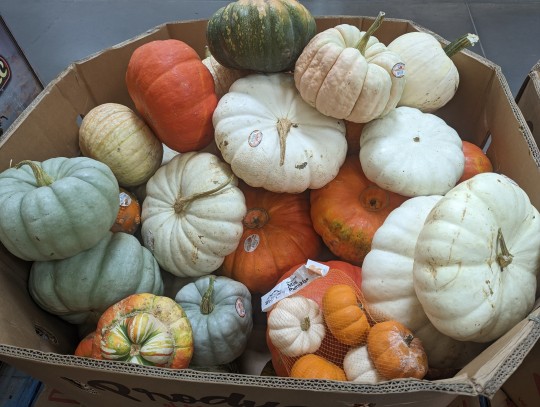
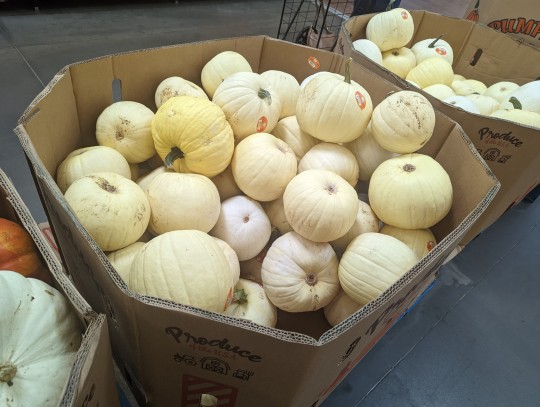
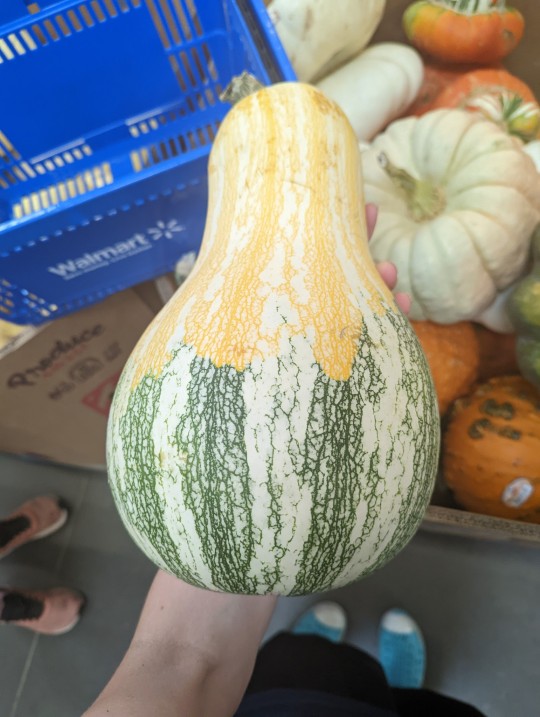
[three images, each showing a large pallet box of pumpkins at Walmart. The first is a rainbow mix of winter squash, the second is all medium white pumpkins, and the third is focused on a single Cushaw squash held in the hand of a white person, which is shaped like a butternut squash, with an orange top, green bottom, and mottled white vertical stripes. End ID ]
Buying "pumpkins" at Walmart and other grocery stores is a quick and easy way to get a few hundred seeds from a dozen or more Winter Squash varieties, and you can use them for homemade pumpkin pie and other desserts after baking*.
Some of the possible heirloom squash varieties (and their hybrid descendants) on display here:
Jarrahdale Blue and Queensland Blue (C. Maxima)
Flat White Boer (C. Maxima)
Turk's Turban (C. Maxima)
Musquee de Provence (C. Moschata)
Rouge vif D'Etampes (C. Maxima)
Porcelain Doll F1 (C. Maxima)
One Too Many F1 (C. Maxima)
The Cushaw in the third picture is most likely Autumn Colors F1, ( C. Mixta or C. Aegyrosperma depending on who you ask.)
To save Winter Squash seeds, all you need is a sturdy knife, some good arm strength, and a strainer; chop the squash in half (carefully! Their hard outer shell makes them store well but also makes them difficult to cut), scoop out the seeds, and give them a good rinse in the strainer before laying out in a single layer on a screen or plate to dry for a few days before storage.
*To make homemade pumpkin puree out of any winter squash: simply chop, deseed, roast until fork-tender, puree, and then allow to drain over a bowl in cheesecloth-- and keep that 'pumpkin juice' for watering plants or perhaps use it in fall drinks?
You can also cook squash by boiling it, as well as in a slow cooker!
13 notes
·
View notes
Text
I've read it somewhere that cataluna also got colonized pffffff what do you mean also got colonized? The natives were celt and that part got influenced by phoenicians who emigrated there for some reason then it got sacked by visigoths then ancient rome colonized europe entirely and then the moors who I think was only white people that were living in north africa probably even turks but not the native ones or visgoths with turbans which makes sense since they were sacking places and they could have went to turkey and then went around the middle east and then north of africa, so yeah they were white people with arabic culture and then catholics expelled all the muslims and jews so all that culture went back to their native land and in the end the people that stayed in here are descendants of all of those societies so how in the hell are they considered any different from the rest of spain? Portugal was the only place in the peninsula that survived spanish homogenization althought our royals were always married with spanish royals for them to maintain control of our country... so if there's people that got the end of the stick it is the portuguese.
2 notes
·
View notes
